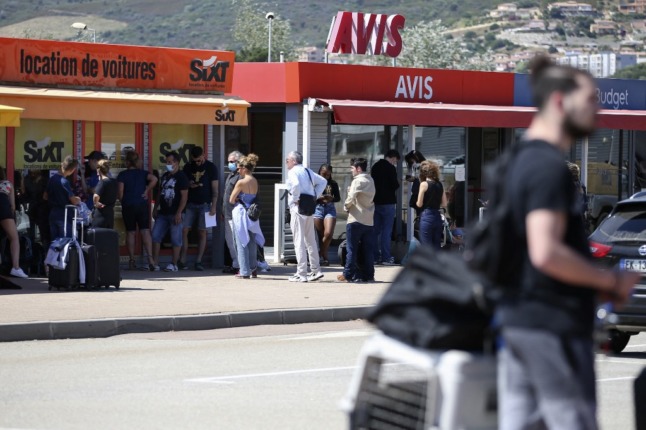In many areas popular with tourists cars are simply not available or subcompacts are going for a stiff €500 euros.
Car rental comparison websites show just how expensive renting a vehicle has become for tourists this summer.
According to Carigami, renting a car for a week this summer will set tourists back an average of 364 euros compared to 277 euros two years ago.
For Italy, the figure is 407 euros this summer compared to 250 euros in 2019. In Spain, the average cost has jumped to 263 euros from 185 euros.
According to another website, Liligo, daily rental costs have nearly doubled on the French island of Corsica. At the resort city of Palma on the Spanish island of Mallorca, rental prices have nearly tripled.
Today’s problem is a direct result of the coronavirus pandemic.
Faced with near absence of clients, selling off vehicles to raise cash made a lot of sense for car rental firms struggling to survive.
“Everyone drastically reduced their fleet,” said the head of Europcar, Caroline Parot.
Until the spring, most companies still had fleets roughly a third smaller than in 2019, she said.
Car rental firms are used to regularly selling their vehicles and replacing them, so rebuilding their inventory should not have been a problem.
Except the pandemic sent demand for consumer electronics surging, creating a shortage of semiconductors, or chips, that are used not only in computers but increasingly in cars.
“A key contributor to the challenge right now is the global chip shortage, which has impacted new vehicle availability across the industry at a time when demand is already high,” said a spokesman for Enterprise.
It said it was working to acquire new vehicles but that in the mean time it is shifting cars around in order to better meet demand.
No cars, try a van
“We’ve begun to warn people: if you want to come to Italy, which is finally reopening, plan and reserve ahead,” said the head of the association of Italian car rental firms, Massimiliano Archiapatti.
He said they were working hard to meet the surge in demand at vacation spots.
“But we’ve got two big islands that are major international tourism destinations,” he said, which makes it difficult to move cars around,
especially as the trip to Sardinia takes half a day.
“The ferries are already full with people bringing their cars,” he added.
“Given the law of supply and demand, there is a risk it will impact on prices,” Archiapatti said.
The increase in demand is also being seen for rentals between individuals.
GetAround, a web platform that organises such rentals, said it has seen “a sharp increases in searches and rentals” in European markets.
Since May more than 90 percent of cars available on the platform have been rented on weekends, and many have already been booked for much of the summer.
GetAround has used the surge in demand to expand the number of cities it serves.
For some, their arrival can’t come fast enough.
Bruno Riondet, a 51-year-old aeronautics technician, rents cars to attend matches of his favourite British football club, Brighton.
“Before, to rent a car I was paying between 25 and 30 euros per day. Today, it’s more than 90 euros, that’s three times more expensive,” he said.
In the United States, where prices shot higher during the spring, tourists visiting Hawaii turned to renting vans.
In France, there are still cars, according to Jean-Philippe Doyen, who handles shared mobility at the National Council of Automobile Professionals.
“Clients have a tendency to reserve at the last minute, even more so in the still somewhat uncertain situation,” he said.
They will often wait until just a few days before their trip, which means car rental firms don’t have a complete overview of upcoming demand, he added.
He said business is recovering but that revenue has yet to reach pre-pandemic levels as travel is not yet completely unfettered.
SEE ALSO: British drivers will no longer need an insurance ‘green card’ to visit Europe, EU rules



 Please whitelist us to continue reading.
Please whitelist us to continue reading.
On my last trip back to the UK I noticed Avis had closed loads of branches, very few of the non-airport ones survive. Back in Italy they’ve also closed locations too, Ferrara no longer shows up when I do a search, the nearest is Bologna.
I was in the UK just as the first pandemic was starting to hit, demand had slumped and prices were very low. It seems to survive they shut a lot of their branches as well as selling off a lot of their cars.